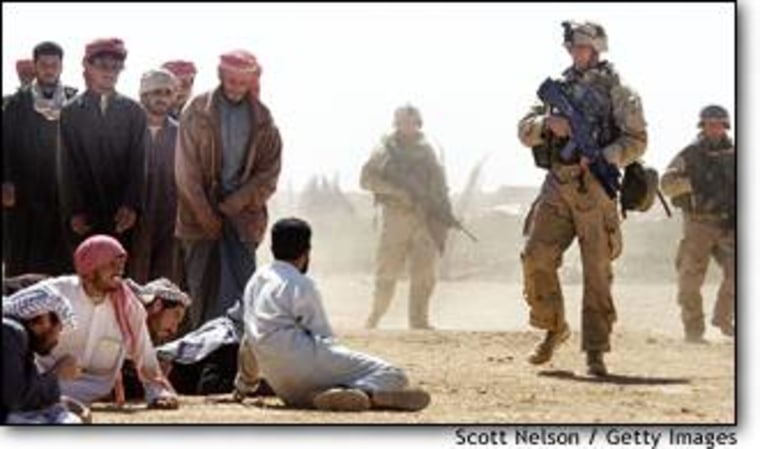With scattered fighting still under way in Baghdad, the north of Iraq not yet secured — despite the fall of Kirkuk and Mosul — and growing lawlessness everywhere, the campaign against Saddam Hussein’s regime is still not over. Meanwhile, the Defense Department is scrambling to find some way to get an Iraqi face on the administration of the country before the Iraqis and the rest of the Arabic world become convinced that this is nothing more than an American occupation. The problem for the U.S.: It doesn’t seem ready to fight and administer simultaneously.
One cause of the world’s impatience is the failure of the Bush administration to manage expectations about the length of the conflict. Experienced military people know that a major campaign takes time — time to seize objectives, to secure seized areas, to control populations.
But while the national command authority has said many times that this conflict will not be easy, it did nothing in the days leading up to the fight to counter the popular notion that war in Iraq would be quickly over. Indeed, top officials spoke repeatedly about “a war like no other,” for example, and when the unfortunate sobriquet “shock and awe” convinced many people that precision guided munitions would permit us to wrap up the Iraqis in short order, there was nothing from the U.S. Defense Department in rebuttal.
So while it is clear that the tactical objectives were chosen with some care, and the rather risky use of a light force has been thus far successful, CENTCOM has several problems that will not go away overnight.
WE NEED MORE TROOPS
First, we may have been either smart or lucky about using only a bit more than three divisions to prosecute the campaign, but that is demonstrably not enough of a force both to finish the offensive job and to protect lines of communication, the rear, and the mass of civilians who now have no government.
One could argue that no government is better than the one they had, but it doesn’t help the world view of the campaign to hear of lawlessness in the streets of Baghdad and Basra, looting, and vengeful murders like those that took place in the mosque in Najaf on Thursday.
We may have done an excellent job of sparing vital infrastructure from destruction because we targeted with great care and precision, but that will be for naught if mobs steal and destroy what we carefully protected during the campaign. The paucity of American military police units and civil affairs units is already beginning to tell.
Second, a lack of operating governance results in a lack of basic services. The coalition is working hard to repair facilities and provide humanitarian relief, but, with most forces busy full time trying to get rid of the old regime, there is only limited success here. And anyway, what we want others to see is Iraqi government, not American occupation.
WHO REPRESENTS IRAQIS?
Third, we cannot be sanguine about the ease with which we can organize something that looks like a government that is representative of all or most of the Iraqi people. The initial performance in this regard has not been good, with at least one leader, selected by the British commander in the Basra region, being immediately attacked when it was revealed that he had been an officer in the Iraqi forces. We will have to do better than that.
Nor is it going to be easy to structure a national government. There is plenty of animosity to go around among the Kurds, Sunnis and Shiites, and there will be no government that can be both easily organized and acceptable to everyone.
In the end, we may discover that the best form of rule will be something akin to our own system: a structure in which geographical groups co-exist in a federation that dominates the will of its components. Undoubtedly, the major religious groups will also seek separate representation, as in Israel for example, so that minorities like the Sunni cannot become too strong for their numbers.
OCCUPY, WITH U.N. HELP
In the meantime, there is no doubt about it: No matter how we try to convince others to the contrary, the only way we can prevail in the aftermath of the military campaign is to have a good, old-fashioned occupation. Some of the heat can be taken off the American back by involving the United Nations, no matter how distasteful this may be.
In this regard, look for Kofi Annan, unhappy about being upstaged by current events, to begin making lots of noise as soon as he can raise his voice above the din of exploding projectiles. Surely France, Germany and Russia will persist in being included, particularly Russia, who is owed a huge monetary debt by Iraq and will seek, unsuccessfully, one would think, repayment from the new government. These three are, in fact, meeting today to plot how to insinuate themselves back into the Iraqi picture.
Whatever is organized, it will be some time before a workable government can begin to take the reins of power, and if our experience in Afghanistan is any precedent, we will not be particularly happy with the result.
(Col. Jack Jacobs (U.S. Army retired) is an MSNBC military analyst.)
